Barcelona at the Ballot Box: Inside the Club's Pivotal Presidential Election
When the era ended has been the subject of debate. There are as many options as there are opinions.
Maybe it was when Neymar left for Paris, or when Andrés Iniesta departed for Japan. Maybe it happened gradually, under the management of Ernesto Valverde or his successor, Quique Setién. He presided over the conclusion of Barcelona’s first trophy-less season in 12 years. Or perhaps it came crashing down on one agonizing evening last August, as Bayern Munich scored goal after goal in an 8–2 Champions League rout. And if it wasn’t that night, then the subsequent burofax from want-away icon Lionel Messi surely indicated that their romance, and Barcelona’s reign as the club that redefined the sport, was over.
The date may be in doubt, but Barcelona’s status isn’t. An era ended. It’s a club in trouble, if not crisis, and it’s no longer the unbeatably fluid football machine that beguiled the world starting in the late 2000s. That part is certain. What’s also certain is that when one era ends, another begins. And the date that Barcelona’s new era kicks off is well defined. It’s been in print, online and all over the airwaves throughout Catalonia for weeks. It’s Sunday—the day tens of thousands of Barcelona members go to the polls to elect the president who will, over his six-year term, tackle the club’s problems and set a course toward the future.
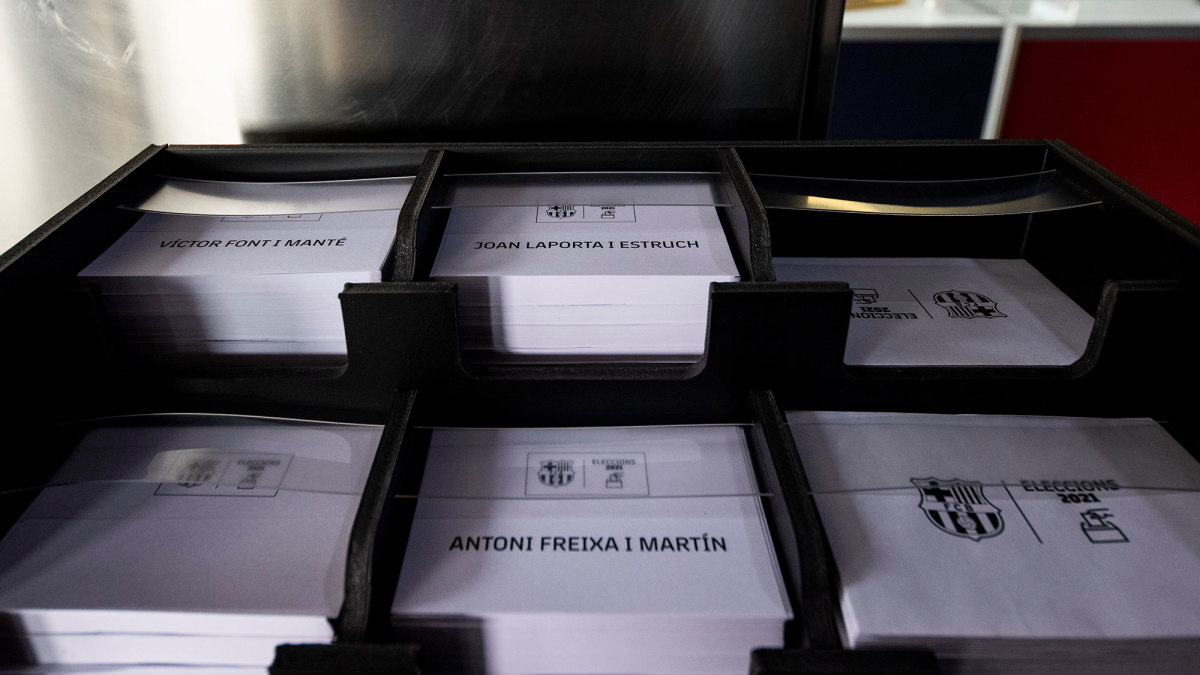
Barcelona is at an inflection point. Messi’s contract is expiring, and he hasn’t announced his intentions. Questionable, hasty player personnel decisions and the ongoing pandemic have crushed the club’s bottom line, resulting in a €128 million ($144 million) pretax loss in the fiscal year that ended last June and debts that reportedly approach €1.2 billion, a significant chunk of which is short term.
That makes it increasingly difficult (but not impossible), to keep up with the handful of privately owned super teams that now compete for continental dominance. Barcelona’s cavernous Camp Nou stadium, which opened in 1957, is antiquated and lacks cover, suites and other modern amenities. And the club has been tainted by mismanagement and scandal, from Monday’s arrest of former president Josep Bartomeu, to this week’s ruling by the European Court of Justice that the club, along with Real Madrid, benefited from millions in improper state aid.
But Sunday’s election is more than a crossroads. It represents an opportunity, not to mention a window into a century of history and culture and a unique organization’s deep ties to its unique region. Barcelona isn’t the only member-owned club in the world. There are three others in Spain—Real Madrid, Athletic Bilbao and Osasuna—and more in Germany, Turkey, Brazil and elsewhere. The NFL’s Green Bay Packers are owned by stockholders who don’t participate directly in the franchise’s governance. Three Canadian Football League teams have shareholders as well.
Because of its size, history and status in Catalonia, however, and because of how active, engaged and powerful its members are—and because of the power of its president—Barcelona stands alone. It is, as they say, “Més que un club,” or “More than a club.” Sunday’s vote is a significant event in the sports world, and it comes with all the trappings and coverage of a major political election. Advertisements are everywhere. Debates are televised. Locals couldn’t escape it if they wanted. FC Barcelona is the cultural axis around which Catalonia revolves. It was a refuge during the Spanish Civil War and then the dictatorship of Francisco Franco—the place where language, culture and identity could be preserved. Now, FCB is Catalonia’s most famous export, an extension of Spain’s Northeast that reaches all corners of the planet.
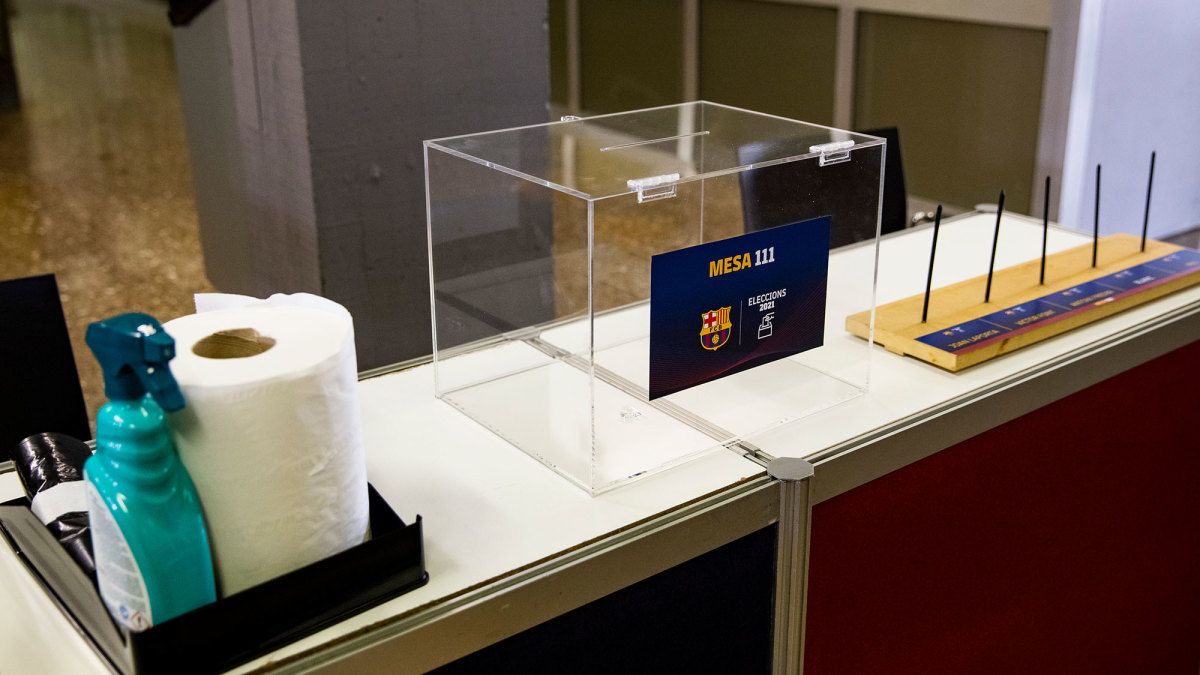
Barcelona guards this identity with vigor. It’s considered a strength. Catalan is the language of the club, and FCB remains closely connected to the politics of Catalan nationalism. It also limits membership, in order to ensure local bonds aren’t weakened. Opening up membership to the world would be a great way to raise money. It also probably would ensure that the club’s leadership—the president appoints the board of directors and essentially names the CEO, sporting director and head coach—is determined by voters outside Catalonia and Spain. So Barcelona ignores this quick financial fix in favor of maintaining its strong ties to home soil. This is an organization where idealism still trumps the bottom line. There now are about 144,000 socis, or members, who each pay a €185 annual fee. The hurdles to become a soci are high—one must either have a close relative who already is a member, or one must apply in person for a “Commitment Card,” which means at least three years of membership dues without most of the rights or benefits.
Those members, many of whom are among several generations of local families bound to the club, will choose the new president from among their ranks—and from among three candidates—on Sunday. Barcelona has suffered recently, but it remains a force. While the 4–1 Champions League round-of-16 deficit to Paris Saint-Germain might be too much to overcome, the Blaugrana have advanced to the Copa del Rey final and are just five points out of first place in La Liga. Barcelona is the eighth-most valuable sports team in the world, according to Forbes, at $4.02 billion, and ranked first among soccer clubs in 2019–20 revenue (€715.1 million), according to Deloitte. And even though Messi’s future is uncertain, the talismanic 33-year-old might decide to continue playing alongside promising young teammates like Pedri, Ansu Fati and Riqui Puig.
In other words, the incoming president will have something to work with and assets at his disposal. Barcelona is, in some ways, a sleeping giant. It just needs to navigate this rough patch successfully.
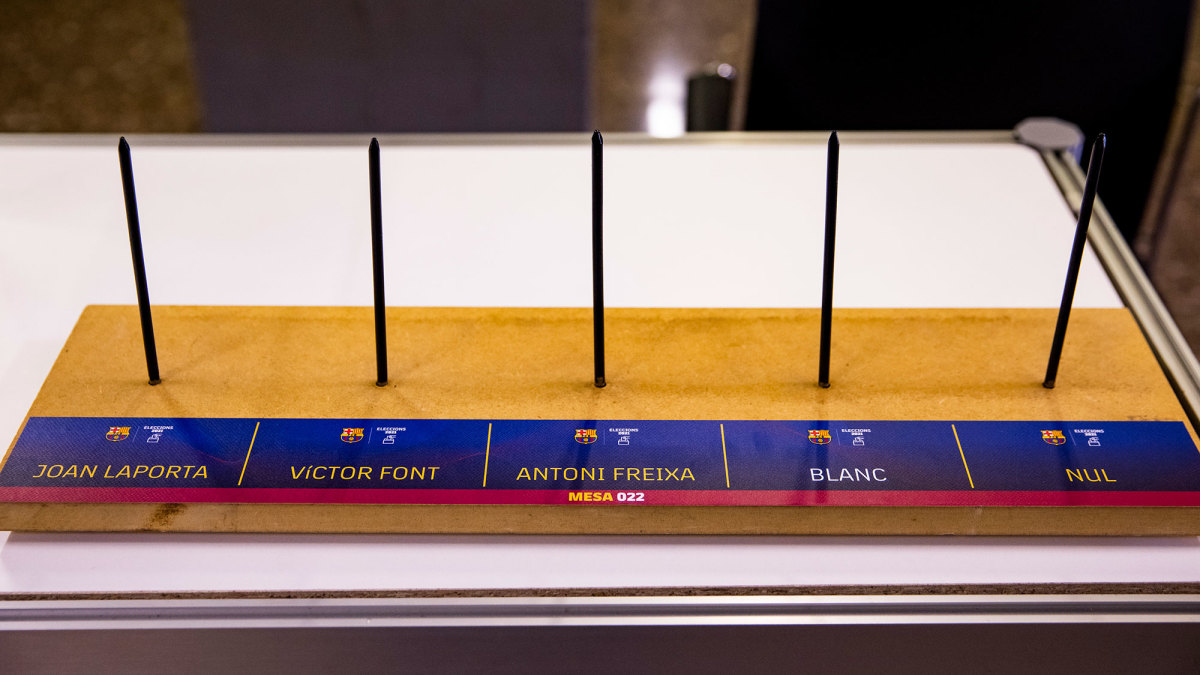
"The only thing I'm concerned about right now is in one week we will have a new president,” said former FCB and current Manchester City manager Pep Guardiola when asked about Monday’s arrests.
That’s the power of Barcelona—Guardiola, a Catalan native and longtime Blaugrana player who left the club in 2012, still says “we.”
“Hopefully as many people as possible can vote and choose the right president to lead this incredible club,” he added. “I’m pretty sure Barcelona will come back stronger in a short time. The new president will have to lead with confidence, join the team and fans together as one, and it's going to be [again] the club that we are. I'm looking forward to the election next Sunday and hopefully the president we choose will be O.K.”
Speaking to reporters this week, La Liga president Javier Tebas said, “What worries me the most is the club’s institutional instability, not its financial difficulty. When a new president is elected I’m certain that the club will overcome this situation.”
This election offers the promise, or at least the possibility, of renewal and a return to glory. Imagine if North American season-ticket holders could oust Daniel Snyder, James Dolan or Eugene Melnyk. At FCB, the person with all the power is chosen from among its members, and subject to the approval of those members (Bartomeu resigned in October before facing a vote of no confidence). The president isn’t permanent. And like any politician, the Barcelona president will be expected to keep his promises.
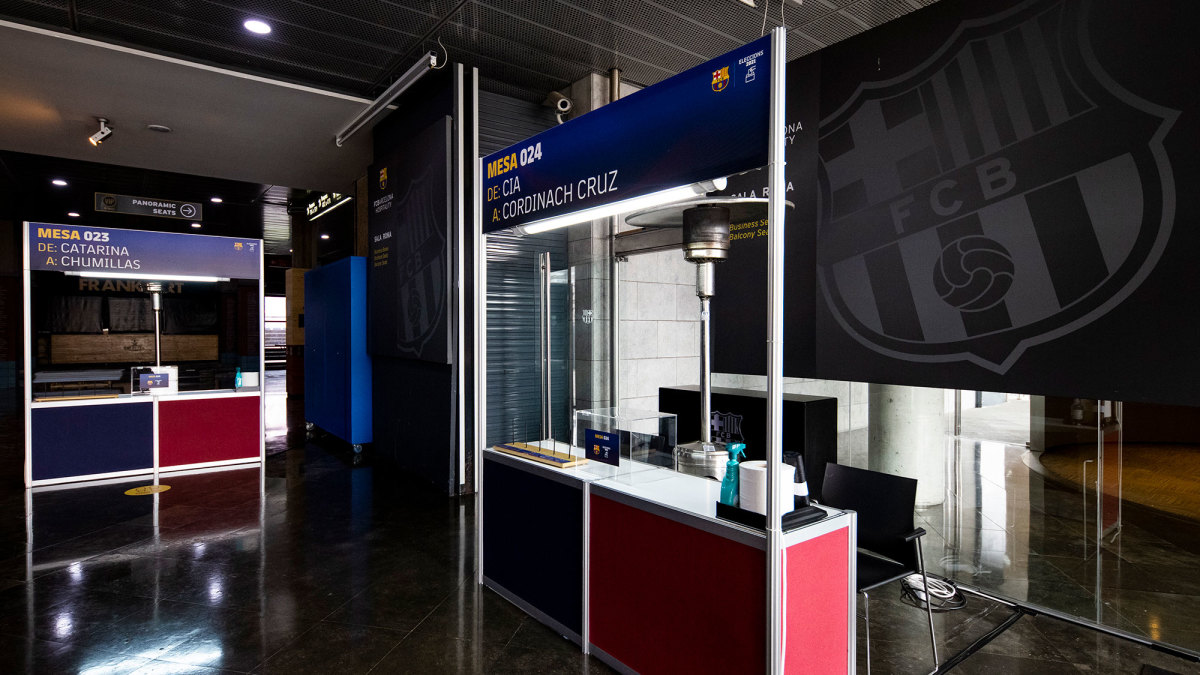
In some ways, Sunday’s election is a very modern one. The three candidates have slick websites, social media and ad campaigns, and the press has been following their every move. There’s polling and three public debates, the last of which will be broadcast Friday evening by Catalonia’s TV3. There have been Zoom campaign calls with voters. But in other ways, the process is still a bit old-fashioned. Until this year, voting took place only at the Camp Nou. That meant socis from outside Barcelona or abroad would have to fly in to take part.
This month, in a nod to the coronavirus (the election was postponed from January because of the pandemic), there will be six physical voting locations throughout Catalonia and Andorra. Voting by mail also will be allowed for the first time, although only from points in Spain. To be eligible to vote, a soci must be 18, must have been a member for at least a year and must never have had his or her membership suspended. Those rules reduce the electorate to around 111,000 socis, of which nearly 23,000 applied to vote by mail. Local laws prohibit online voting.
To be eligible to run, a candidate must have been a soci for at least 10 years, must obtain more than 2,200 supporting signatures from fellow members, and must be able to guarantee an ability to contribute 15% of the club’s annual revenue to club accounts in case they’re deemed responsible for financial losses (Bartomeu isn’t responsible for furnishing that 15% because deficits under his leadership were exacerbated by the pandemic, according to club sources). That means, in practice, candidates for the FCB presidency will be among the club and business elite—those who have the connections to compile signatures and raise lots of money.
The funds spent on advertising are personal. Although only a small percentage of the region is able to vote—Catalonia has a population of around 7.5 million—the prominence of the FCB president ensures advertising is widespread. From billboards and buses to newspaper and radio ads, the election is ever-present. Favorite Joan Laporta, who was FCB president in 2003–10, even bought a massive ad in Madrid, plastering his face on a building-size banner just down the street from Real Madrid’s Estadio Santiago Bernabéu that read, “Ganas De Volver A Veros,” or, “Looking forward to seeing you again.”
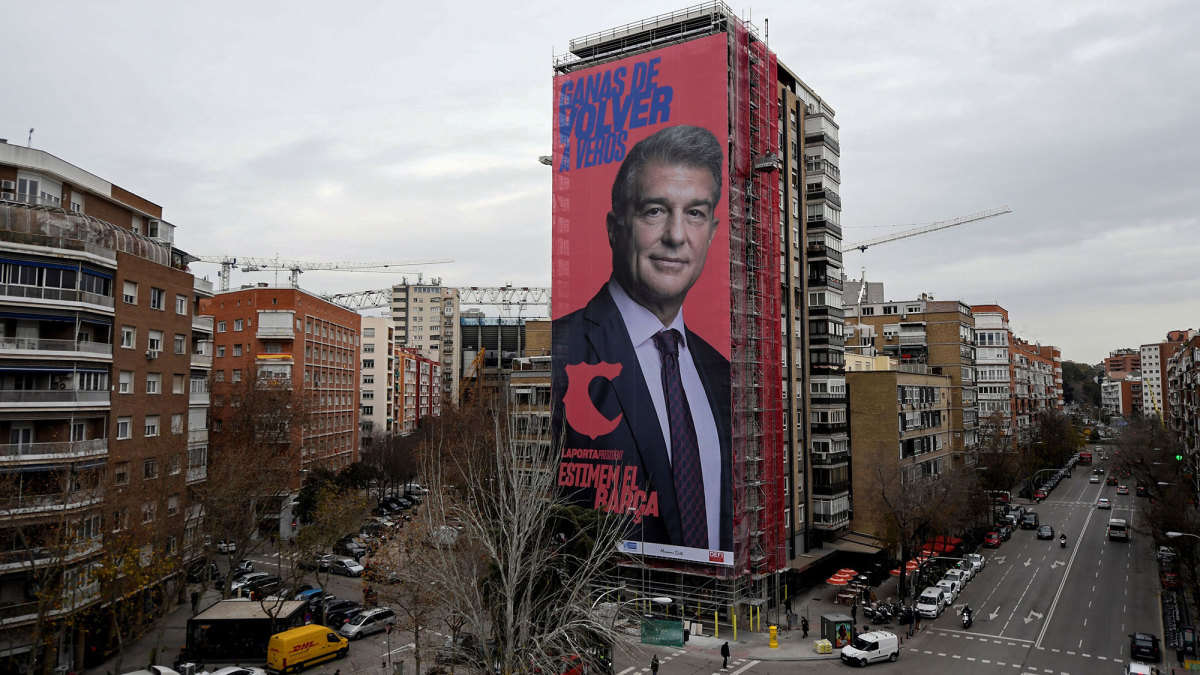
“It’s an electoral campaign, a presidential campaign, on a smaller scale. It’s the same process, but the difference is that only 110,000 members can vote, so you can spend €1 million or €1.5 million in the campaign asking for the vote of 110,000 members,” explained Antoni Bassas, a journalist working closely with the second-favorite candidate, businessman Victor Font.
Bassas will be Font’s chief of staff if the election goes their way. An important part of a candidate’s pitch to voters is the list of socis who will be joining the board and running the club.
“It’s a small percentage who vote, but at the same time you have to create the social idea all around the country that you can be a good president,” Basses continued. “Maybe in your family you are the only one who votes—not your wife or son or daughter. But you need to be sure that your wife, your son or your daughter, thinks this man could be a good president. So you need to create a favorable idea and that means to use the tools of the mass media. It’s a little insane, but it’s like that.”
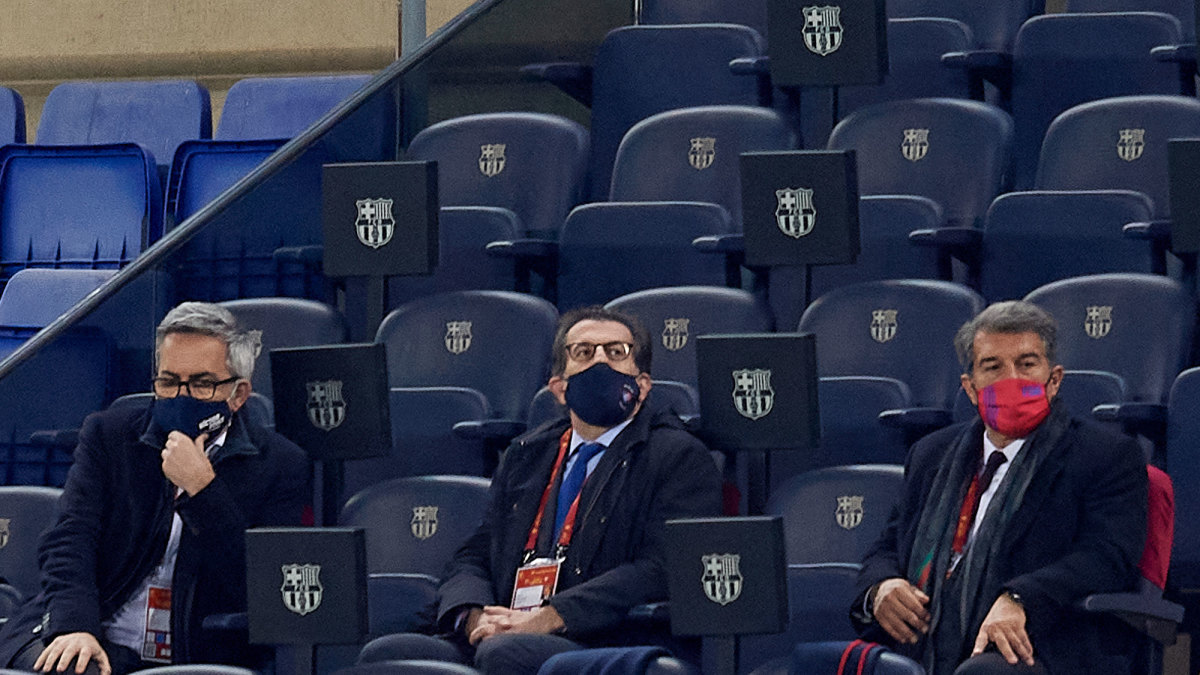
Messaging is important especially because the three candidates—former board member Toni Freixa is the third—don’t differ from each other in profound, existential ways. No one is calling for an adjustment to the members-only model that would permit external or institutional investors. All acknowledge the gravity of FCB’s financial situation and have committed to confronting and fixing it. All are in favor of the Espai Barca project, an $800 million operation to modernize the Camp Nou and the club’s Palau Blaugrana arena, along with the offices and development surrounding the stadium. And of course, all want to keep Messi in the fold.
“One word from Messi, and the election is over,” Bassas told Sports Illustrated in a half-joking and totally serious manner.
But absent that word, which isn’t coming, the candidates are left to be judged by their detailed differences—who they’ll appoint and hire, how they’ll rebuild and refinance. Font, for example, wants to bring former midfielder Xavi Hernández back as general manager. Freixa believes Ronald Koeman should continue as head coach. Laporta has been linked to a pursuit of Borussia Dortmund scoring machine Erling Haaland. Promises can border on the political—the candidates are pursuing votes after all, but they also must be realistic. Barcelona voters are educated, and they can check the president’s power. Big club decisions are vetted by an annual general assembly, which numbers more than 4,000 longtime socis. And massive moves, like Espai Barca, are subject to a full referendum.
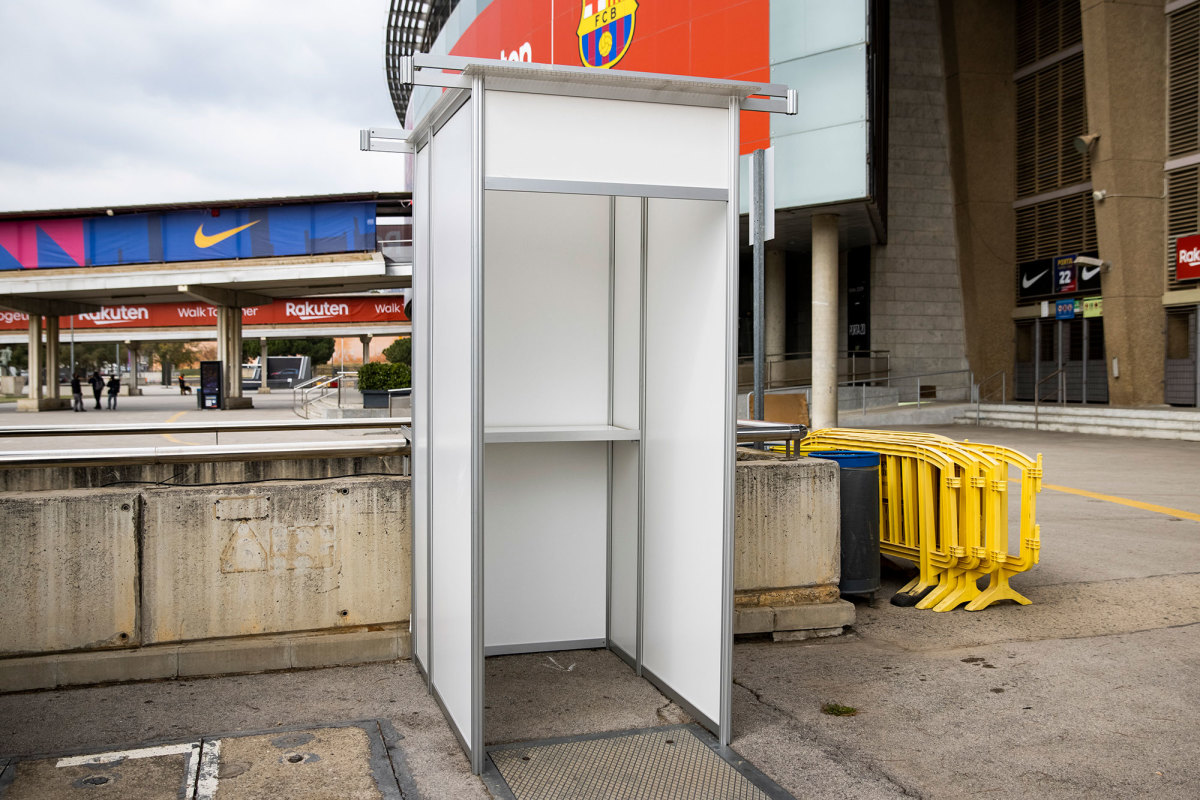
Democracy is messy and inefficient. It takes a lot of labor, it can result in choices that don’t work out and in moves made for political points, like Bartomeu’s hasty and expensive signings of Ousmane Dembélé and Philippe Coutinho following Neymar’s departure. It means there are no saviors, no state investment funds or oligarchs who can make financial problems disappear. And it can make sacrificing the short term for the long term next to impossible. What if selling Messi last year and rebuilding around FCB’s young, cheaper core was the right move? The socis would never allow it. Some say sports are a business and decisions shouldn’t be sentimental. But Barcelona is all sentiment. And this club, which draws its identity from the people and region it represents, wouldn’t have it any other way.
“This sounds like the Iowa caucuses, these people united in the middle of January surrounded by snow and deciding what candidate they’re going to endorse,” Bassas said. “This is part of our cultural heritage, and I have to say, and the history proves, that the system works; Barcelona has won five Champions Leagues, a lot of Spanish titles, both La Liga and Spanish Cup. Barcelona is one of the renowned clubs in the world and being a club—always being a club. So if the past proved that, why not the future?”
